Related Research Articles
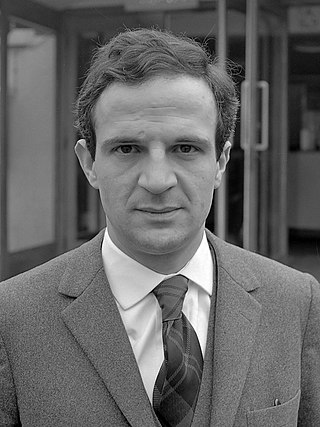
François Roland Truffaut was a French filmmaker, actor, and critic, widely regarded as one of the founders of the cinematic French New Wave. With a career of more than 25 years, he is an icon of the French film industry.

Jean-Paul Charles Belmondo was a French actor. Initially associated with the New Wave of the 1960s, he was a major French film star for several decades from the 1960s onward, frequently portraying police officers and criminals in action thriller films. His best known credits include Breathless (1960), That Man from Rio (1964), Pierrot le Fou (1965), Borsalino (1970), and The Professional (1981). An undisputed box-office champion like Louis de Funès and Alain Delon of the same period, Belmondo attracted nearly 160 million spectators in his 50-year career. Between 1969 and 1982 he played four times in the most popular films of the year in France: The Brain (1969), Fear Over the City (1975), Animal (1977), Ace of Aces (1982), being surpassed on this point only by Louis de Funès.

Jean-Luc Godard was a French and Swiss film director, screenwriter, and film critic. He rose to prominence as a pioneer of the French New Wave film movement of the 1960s, alongside such filmmakers as François Truffaut, Agnès Varda, Éric Rohmer and Jacques Demy. He was arguably the most influential French filmmaker of the post-war era. According to AllMovie, his work "revolutionized the motion picture form" through its experimentation with narrative, continuity, sound, and camerawork. His most acclaimed films include Breathless (1960), Vivre sa vie (1962), Contempt (1963), Band of Outsiders (1964), Alphaville (1965), Pierrot le Fou (1965), Masculin Féminin (1966), Weekend (1967) and Goodbye to Language (2014).

Alphaville: une étrange aventure de Lemmy Caution is a 1965 French New Wave tech noir film written and directed by Jean-Luc Godard. It stars Eddie Constantine, Anna Karina, Howard Vernon and Akim Tamiroff. The film won the Golden Bear award of the 15th Berlin International Film Festival in 1965.
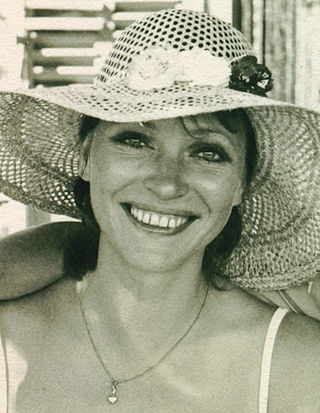
Anna Karina was a Danish-French film actress, director, writer, model, and singer. She was an early collaborator of French New Wave director Jean-Luc Godard, her first husband, performing in several of his films, including The Little Soldier (1960), A Woman Is a Woman (1961), My Life to Live (1962), Bande à part, Pierrot le Fou (1965), and Alphaville (1965). For her performance in A Woman Is a Woman, Karina won the Silver Bear Award for Best Actress at the Berlin Film Festival.

Breathless is a 1960 French New Wave crime drama film written and directed by Jean-Luc Godard. It stars Jean-Paul Belmondo as a wandering criminal named Michel, and Jean Seberg as his American girlfriend Patricia. The film was Godard's first feature-length work and represented Belmondo's breakthrough as an actor.

Contempt is a 1963 French New Wave drama film written and directed by Jean-Luc Godard, based on the 1954 Italian novel Il disprezzo by Alberto Moravia. It stars Brigitte Bardot, Michel Piccoli, Jack Palance, Fritz Lang, and Giorgia Moll.

Pierrot le Fou is a 1965 French New Wave romantic crime drama road film written and directed by Jean-Luc Godard, starring Jean-Paul Belmondo and Anna Karina. The film is based on the 1962 novel Obsession by Lionel White. It was Godard's tenth feature film, released between Alphaville and Masculin, féminin. The plot follows Ferdinand, an unhappily married man, as he escapes his boring society and travels from Paris to the Mediterranean Sea with Marianne, a young woman chased by OAS hitmen from Algeria.

Anne Wiazemsky was a French actress and novelist. She made her cinema debut at the age of 18, playing Marie, the lead character in Robert Bresson's Au hasard Balthazar (1966). A year later she married the director Jean-Luc Godard and appeared in several of his films, including La Chinoise (1967), Week End (1967), and One Plus One (1968).
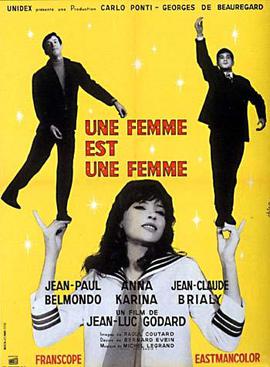
A Woman Is a Woman is a 1961 French experimental musical romantic comedy film written and directed by Jean-Luc Godard, starring Jean-Paul Belmondo, Anna Karina and Jean-Claude Brialy. It is a tribute to American musical comedy and associated with the French New Wave. It is Godard's third feature film, and his first in color and Cinemascope.
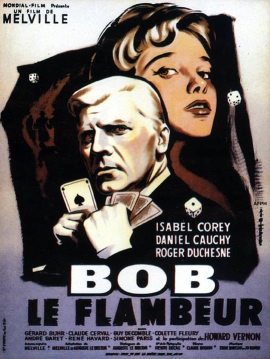
Bob le flambeur is a 1956 French heist gangster film directed by Jean-Pierre Melville and starring Roger Duchesne as Bob. It is often considered both a film noir and a precursor to the French New Wave, the latter because of its use of handheld camera and a single jump cut.
All Boys Are Called Patrick is a 1957 French short film written by Éric Rohmer and directed by Jean-Luc Godard and made before both filmmakers achieved fame as French New Wave filmmakers.
Daniel Boulanger was a French novelist, playwright, poet and screenwriter. He has also played secondary roles in films and was a member of the Académie Goncourt from 1983 until his death. He was born in Compiègne, Oise.
László Kovács may refer to:

King Lear is a 1987 American film directed by Jean-Luc Godard, an adaptation of William Shakespeare's play in the avant-garde style of French New Wave cinema. The script was primarily by Peter Sellars and Tom Luddy. It is not a typical cinematic adaptation of Shakespeare's eponymous tragedy, although some lines from the play are used in the film. Only three characters – Lear, Cordelia and Edgar – are common to both, and only Act I, scene 1 is given a conventional cinematic treatment in that two or three people actually engage in relatively meaningful dialogue.

Hail Mary is a 1985 French avant-garde erotic drama film written and directed by Jean-Luc Godard. The film is a modern retelling of the story of the virgin birth of Jesus. It was entered into the 35th Berlin International Film Festival.
Nouvelle Vague is a 1990 French film written and directed by Jean-Luc Godard. It follows the story of hitchhiker Lennox credited as Lui (He), taken in by a wealthy industrialist, Elena Torlato-Favrini or Elle (She), played by Domiziana Giordano. The film was entered into the 1990 Cannes Film Festival. It has never been released on any home video format in North America, but the audio was issued as a 2CD set by ECM.

Six in Paris is a 1965 French comedy-drama anthology film.
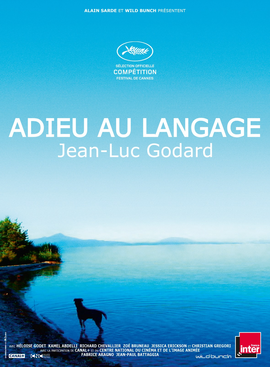
Goodbye to Language is a 2014 French-Swiss narrative essay film written and directed by Jean-Luc Godard. It stars Héloïse Godet, Kamel Abdeli, Richard Chevallier, Zoé Bruneau, Jessica Erickson and Christian Grégori and was shot by cinematographer Fabrice Aragno. It is Godard's 42nd feature film and 121st film or video project. In the French-speaking parts of Switzerland where it was shot, the word "adieu" can mean both goodbye and hello. The film depicts a couple having an affair. The woman's husband discovers the affair and the lover is killed. Two pairs of actors portray the couple and their actions repeat and mirror one another. Godard's own dog Roxy Miéville has a prominent role in the film and won a prize at the Cannes Film Festival. Like many of Godard's films, it includes numerous quotes and references to previous artistic, philosophical and scientific works, most prominently those of Jacques Ellul, Aleksandr Solzhenitsyn and Mary Shelley.
Présentation ou Charlotte et son steak is a French short drama film written and directed by Éric Rohmer in 1951 and post-synchronised in 1961. It features Jean-Luc Godard and the voices of Stéphane Audran and Anna Karina.
References
- ↑ McCabe, Colin (2003). Godard Portrait of the Artist at 70. Bloomsbury. pp. 340–341. ISBN 0747563187.
- ↑ Roud, Richard (1967). Godard. Thames and Hudson. pp. 189. ISBN 0500470103.
- ↑ "Breathless".